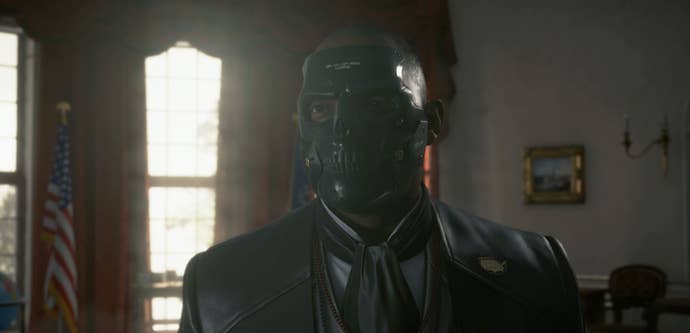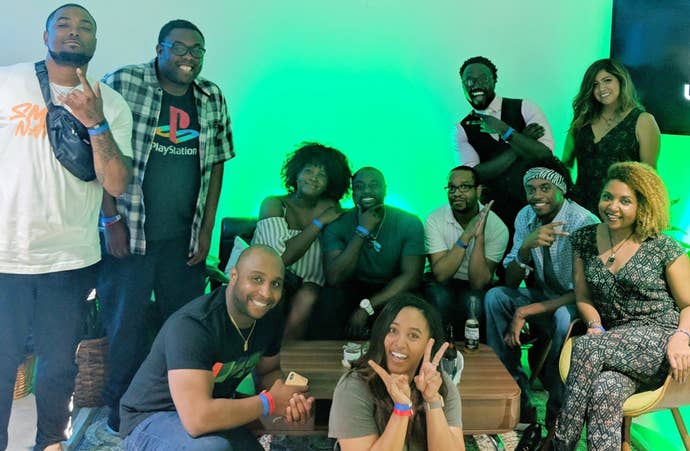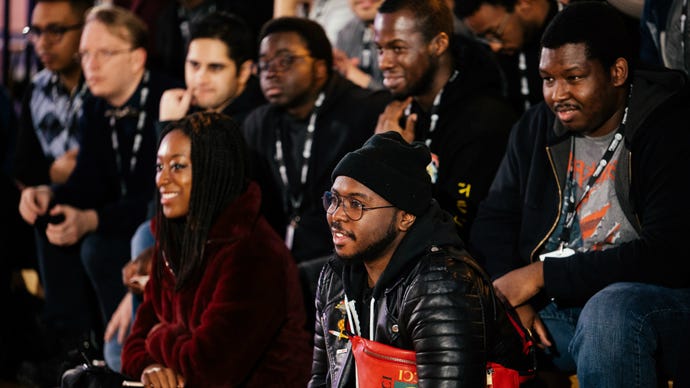Black History Month: Where Are Our Black Gaming Journalists?
Journalism has never been diverse, and correcting the issue requires figuring out what the problem is in the first place.
This article first appeared on USgamer, a partner publication of VG247. Some content, such as this article, has been migrated to VG247 for posterity after USgamer's closure - but it has not been edited or further vetted by the VG247 team.
Marginalized people rightfully ask for more representation of themselves within all aspects of society. With that said, how many black gaming journalists can you name? They are still a noticeable rarity at major publications.
The racial homogeneity of the press has never been a secret to anyone. When I see that this has been a problem for 20 years, the message to me is clear: you don’t belong. People like you don't belong, your work doesn’t belong, and we're ok with that.
As a black person, this is frustrating because it’s another inequality in the marginalized experience. Still, none of this is new and the work by underrepresented people has never stopped. Historically when black folks have been absent from spaces, we’ve responded by creating our own.
When I think of creating your own space and offering unique perspectives, the podcast Spawn On Me by Kahlief Adams comes to mind. It's a black-owned show where you can expect to hear people of color within the gaming space, be they press, developers, or whoever else. Case in point, in November 2019, Spawn On Me released an episode featuring Tommie Earl Jenkins, the actor behind Death Stranding's main (only) black character: Die-Hardman. Adams' platform is the only one to have an interview with the long-time actor about his role and career.
"A lot of people saw the work Tommie did as Die-Hardman and were amazed,"says Adams. "I wanted him to know we loved his work. I thought it was absolutely important we got him on, and let him know how much we appreciated his talent."
Death Stranding gained a lot of attention in part due to its acting talent, which features the likes of Norman Reedus (The Walking Dead), Mads Mikkelsen (Hannibal, Casino Royale), and Léa Seydoux (Blue is the Warmest Color, Spectre). Yet there has hardly been any coverage about Jenkins specifically, and it’s unfortunate that he’s overlooked. It took a black-owned gaming platform to recognize the importance of the only black talent in one of the biggest games of 2019. This serves as an analogy for marginalized experiences within the space; we see each other while the majority often doesn’t.
Part of the problem with lack of black voices is due to the fact that the issue is hardly ever addressed. Now, diversity and inclusion issues within the games media industry have been spoken about, of course. In fact, over on USgamer's sister site Eurogamer, Keza MacDonald looked at clear gender disparities. As professor Kimberlé Crenshaw has shown with intersectionality, a person's identities are not absent from their race, they are interconnected.

There's a number of questions that arise as to why black voices haven't been present. However the lack of black voices within the press isn't new in any way. To get a better idea of this absence, we need to understand that it's an extension of a larger problem. The field of journalism has not had much of a diverse workforce for a while. This in itself is a function of the systemic issues we face as a society.
Publications and sites are digital and physical spaces that should reflect the world around them. A 2019 diversity survey from the American Society of News Editors (ASNE) notes that people of color make up nearly 22% of newsrooms overall. Keep in mind, these are voluntary surveys and not everyone replies. With this information though, we can see the shape of racial dynamics of the industry.
The U.S. Census Bureau estimates that people of color make up nearly 40% of the population; black people in particular account for 13%. So yes, these newsroom numbers don’t reflect our reality. It's important to note that not all newsrooms fail to be diverse. The problem is most aren't.
Granted, games press is more of a specialized set of news and entertainment coverage. Considering the specificity of gaming media, using generalized data may seem unfair. Yet, its news is found among tech, media, and entertainment beats regularly.
We have the numbers, but why is it unlikely that someone like myself or any of my peers wouldn't be hired? It comes down to standards reinforced by traditional hiring practices. When people imagine whom best reflects the values they like or hold, they tend to see a version of themselves when left unchecked. Ted is going to feel more comfortable hiring the qualified person that thinks and looks like he does. This results in the practice of people hiring others who look and act like themselves. So, unconscious bias is a clear and present problem. Biases, be they implicit or unconscious, are something we all possess. So standards are a place that largely determines if you're a good culture fit and hireable. But this is a part of the reason why I, or someone else like me, wouldn't be an ideal candidate.
It’s widely understood that networking is crucial to advancing your career. Business Insider reported in 2017 that almost 70% of job positions are filled through networking alone. Now, considering how small gaming media is, it's not likely general job seekers would have that kind of access anyway. So most folks apply for the 30% of positions made public. That's a highly competitive job market vying for just a small subset of open positions. The career field is so competitive, in fact, it's largely understood that someone is lucky as well as talented should they be hired.
And then there's that age-old phrase: "hiring the best person for the job." A job naturally will list the skills and abilities key to be successful in the role. Would-be employers ask for years of experience at a larger newsroom, contacts within the games industry, and a degree of audio-visual proficiency for entry level positions. Again, the space is smaller, so the chance to create these contacts or amass games-related experience is diminished greatly.
"Sadly, I’m not seeing young black journalists coming through in the U.K.," says Chella Ramanan, a freelance writer. "I’ve asked my peers why this is. Partly, the landscape has changed so much—that there aren’t many publications to write for; it’s highly competitive, and low paying. In addition, editors are in charge of incredible amounts of content and don’t have the time they once had to nurture talent, so you need to be good right away or learn really fast."
As Ramanan says, employers aren't looking for new could-be talent. Generally speaking, the ideal best hire would be someone who's amassed familiarity via interning, freelancing, and working for sites for years. The problem there is that some of this work is done for free or hardly any pay. The likely applicants to meet all these checkmarks are generally white and from middle class backgrounds. Given how the industry operates, experience is everything. If the hiring practices in place are more in favor of a certain group, is it really fair?
When minorities don't see themselves in industries, we create the work and space ourselves. Games reporting has been done by marginalized people for as long as it's been around. They may have not always been seen on the scale of major publications, but the work has been there.
One of the major boons of the past decade has been the development of new audio-visual platforms and tech. Social media, streaming, podcasts, etcetera—there are a lot of resources available to everyone. As each platform was introduced to the world, they've become home to new voices. This has allowed many to reach an audience they may have not been able to otherwise.
Much like a major news site, people have been able to create work that offers analysis, commentary, and research, often by themselves. So, yes black gaming journalism has been around, just not in the traditional sense. Content creators are covering the void through a combination of their interests, expertise, and talent.
There is a near endless pool of talented black content creators who have work dedicated to gaming. Logically speaking, the press is only able to report on a given number of stories. This is great, because these individuals are able to focus attention on ignored topics that are just as relevant. They can provide specialized views, like how fighting game community leader Sharpie shares insight into that community and promotes inclusion. Then there's work by gaming YouTuber Lady Pelvic, who reviews games, particularly RPGs, with humor and honesty.
Streaming via Mixer and Twitch has also allowed for the creation of communities by hobbyists and enthusiasts providing perspective on nearly all things gaming in safe spaces. The Cookout is host to marginalized people who collectively have a love for gaming. Black Girl Gamers, meanwhile, is a representative safe-space platform for black women and an advocate for their inclusion within gaming spaces.
Then we have content creators who cover nearly all the above as a variety show with a podcast in tow. Dead End Gaming is a round table hosted by four friends on the latest topics. Of course, I have to mention Spawn on Me, again.
Even though it's quite abundant, the world of content creation isn't without its frustrations and difficulties. Keep in mind that gaming is a hobby and medium that isn't cheap. This is also not taking into account being able to go to events for industry news. The hurdles that often present themselves are funding, consistency of work, and recognition. Very few people are able to do this as a living. So, a lot of their work and expertise is in lieu of the fact that they, of course, still have full-time jobs and responsibilities. When you take into account the constraints they face, their work is highly commendable.
"It’s no surprise that black talent is deciding that journalism is not for them or feel they won’t be welcome or the workplace will be difficult," says Ramanan. "The talent is there, it just needs an opportunity. Editors have that power and so do staff writers who can bend the ear of the people hiring or taking pitches."
It can't be stated enough that these folks are informative, entertaining, and relevant. These professionals are doing work you would easily find at home with press sites. The difference here is that their work is created for their niche and it unapologetically represents who they are.
The other noticeable issue is that black creators don't get recognition on the same level as their white peers. When you consider the press' role in this, they naturally report on the most popular influencers and talents. Minorities aren't often able to attain those levels of recognition through their efforts alone—despite having work on the same level.
So what are the answers to correct this endemic shortcoming for black journalists? First, it's incumbent of publications to change their methods of hiring. The current system in place regarding hiring and how talent is evaluated is flawed. Groups of people have been kept out for a considerable amount of time. If that's not a clear sign that things aren’t working, then what is? Addressing this will be difficult, but that shouldn’t mean there's no reason to try.

This goes far beyond everyone hiring a few black folks and other people of color on staff. It will require every publication to cultivate and create inclusive work environments. As absurd as it may sound, some people earnestly believe that games journalism really is only for white men. Overhauling that kind of perception will not happen overnight, it'll take years and working with diversity and inclusion consultants. You can’t quickly fix systemic issues.
"Everybody’s path into journalism is different. I spent many years just writing in a quiet corner of the internet, honing my craft, I suppose," says Ramanan. "Hosting a panel gave me a platform, which opened doors and led to my first article at The Guardian. And things just progressed from there."
The pressing question then is why should websites even consider changing? The work from marginalized people not only validates their experiences, it also us to be more critical of gaming. A great example of this is Patricia Hernandez of Polygon's examination of Life is Strange 2 and its framing of the Latinx American experience. This kind of introspective work allows us to see where the game misses its mark in ways we really wouldn’t be able to otherwise.
Perhaps we're closer to having new outlets with fully diverse staff. Ideally, this would show us the invaluable work of those whom are disabled, transgender, neurodivergent, ethnically diverse, and so on. These newsrooms would allow us to see how these voices and their intersections can help view gaming in a new light.
Honestly, my feelings on this matter are complicated. I’m not really all that hopeful that gaming journalism will change and become more diverse. This has been a problem for, again, two decades now. I really don’t see that changing in another decade.
I know I sound pessimistic, but this conversation has almost exclusively only been addressed by black folks. I've barely seen any publication own up to this issue. When you point out systemic issues as a minority, you are often assumed to be problematic and wrong. Everyone wants to believe that hard work alone will allow you to jump over the gatekeeping.
When you're a marginalized person, you have a relationship with the word and practice of opportunity. Its actions, its change, and meaningful equality. You learn that those more privileged than yourself and in positions of power talk often. However the actions needed to change inequality still remain out of your hands.
That's the thing with systemic issues: You need the benevolence of those in power. Yet, you may ultimately never get it. They can easily tell me or anyone else who doesn't look like their staff nothing is broken.
So let's assume nothing changes at all and no one chooses to address this topic aside from underrepresented groups. The perception of this career field being a space for white men will not be an observation, it will be fact. Some of us may never apply to these jobs despite having the credentials because the landscape says "no". And the message will be clear if this continues: You and people like you aren't really welcomed, and we're okay with that. Sure, it's not a good feeling. However I've learned from other black content creators that we create spaces for ourselves that may never come.






